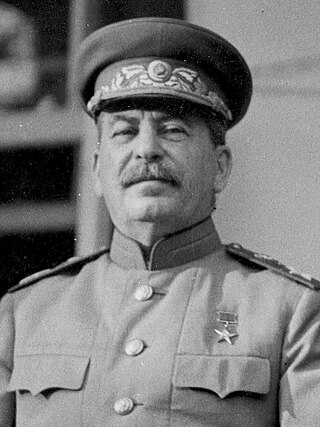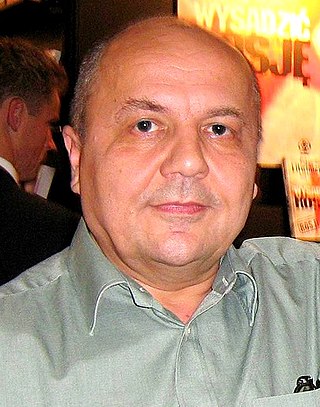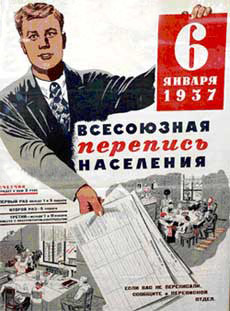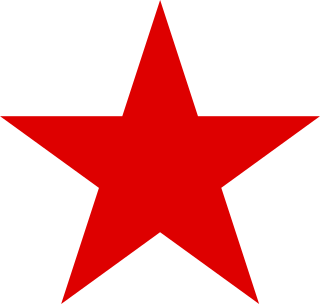
Joseph Vissarionovich Stalin was a communist revolutionary and Soviet politician who led the Soviet Union from 1924 until his death in 1953. He held power as General Secretary of the Communist Party from 1922 to 1952 and Chairman of the Council of Ministers from 1941 until his death. Despite initially governing the country as part of a collective leadership, Stalin consolidated power to become the Soviet Union's undisputed dictator by the 1930s. He formalised his Leninist interpretation of Marxism as Marxism–Leninism, while the totalitarian political system he established became known as Stalinism.

Konstantin Ustinovich Chernenko was a Soviet politician and the seventh General Secretary of the Communist Party of the Soviet Union. He briefly led the Soviet Union from 1984 until his death a year later.

Lev Davidovich Bronstein, better known as "Leon Trotsky", was a Russian revolutionary, politician, and political theorist. He was a central figure in the 1905 Revolution, October Revolution, Russian Civil War, and establishment of the Soviet Union. Trotsky and Vladimir Lenin were widely considered the two most prominent Soviet figures, and Trotsky was de facto second-in-command during the early years of the Russian Soviet Republic. Ideologically a Marxist and Leninist, his thought and writings inspired a school of Marxism known as Trotskyism.

Yuri Vladimirovich Andropov was a Soviet politician who was the sixth leader of the Soviet Union and the fourth General Secretary of the Communist Party of the Soviet Union, taking office in late 1982 and serving until his death in 1984.

Vladimir Bogdanovich Rezun, known by his pseudonym of Viktor Suvorov, is a former Soviet GRU officer who is the author of non-fiction books about World War II, the GRU and the Soviet Army, as well as fictional books about the same and related subjects.

Andrei Aleksandrovich Zhdanov was a Soviet politician. He was the Soviet Union's "propagandist-in-chief" after the Second World War, and was responsible for developing the Soviet cultural policy, the Zhdanov Doctrine, which remained in effect until the death of Joseph Stalin. Zhdanov was considered Stalin's most likely successor but died before him.

Lenin's Testament is a document dictated by Vladimir Lenin in late 1922 and early 1923. In the testament, Lenin proposed changes to the structure of the Soviet governing bodies. Sensing his impending death, he also gave criticism of Bolshevik leaders Zinoviev, Kamenev, Trotsky, Bukharin, Pyatakov, and Stalin. He warned of the possibility of a split developing in the party leadership between Trotsky and Stalin if proper measures were not taken to prevent it. In a post-script he also suggested Joseph Stalin be removed from his position as General Secretary of the Russian Communist Party's Central Committee. Although there are some historical questions regarding the document's origins, the majority view is that the document was authored by Lenin.

Icebreaker: Who Started the Second World War? is a military history book by the Russian non-fiction author Viktor Suvorov, published in 1989. Suvorov argued that Joseph Stalin planned a conquest of Europe for many years, and was preparing to launch a surprise attack on Nazi Germany at the end of summer of 1941 to begin that plan. He says that Operation Barbarossa was a pre-emptive strike by Adolf Hitler, a claim which the Nazi leader himself had made at the time. Since the 1990s and the dissolution of the Soviet Union, this theory has received some support among historians in some post-Soviet and Central European states, but some Western scholars have criticized his conclusions for lack of evidence and documentation.

Georgy Vasilyevich Chicherin was a Russian Marxist revolutionary and a Soviet politician who served as the first People's Commissar for Foreign Affairs in the Soviet government from March 1918 to July 1930.
Dmitri Antonovich Volkogonov was a Soviet and Russian historian and colonel general who was head of the Soviet military's psychological warfare department. After research in secret Soviet archives, he published a biography of Joseph Stalin and Vladimir Lenin, among others such as Leon Trotsky. Despite being a committed Stalinist and Marxist–Leninist for most of his career, Volkogonov came to repudiate communism and the Soviet system within the last decade of his life before his death from cancer in 1995.
Mikhail Ivanovich Meltyukhov is a Russian military historian.

Vladimir Nevezhin is a Russian historian, is working as a professor in Moscow, chief scientific collaborator at the Institute of Russian History and member of the editorial board of the journal Отечественная история.

The 1937 Soviet census held on January 6, 1937, was the most controversial of the censuses taken within the Soviet Union. The census showed lower population figures than anticipated,, although it still showed a population growth from the last census in 1926, from 147 million to 162 million people in 1937. The results of the census were almost immediately announced to be "harmful" and the workers who were responsible for it were arrested and repressed.

The Soviet offensive plans controversy was a debate among historians in the late 20th and early 21st centuries as to whether Joseph Stalin had planned to launch an attack against Nazi Germany in the summer of 1941. The controversy began with Soviet defector Viktor Suvorov with his 1988 book Icebreaker: Who started the Second World War? In it, he claimed that Stalin used Nazi Germany as a proxy to attack Europe.

Oleg Vitalyevich Khlevniuk is a Russian historian of the Soviet Union.

Mikhail Vasilyevich Frunze was a Soviet revolutionary, politician, army officer and military theorist. Born to a Bessarabian father and a Russian mother in Russian Turkestan, Frunze attended the Saint Petersburg Polytechnical University and became an active member of the Russian Social Democratic Labour Party (RSDLP). Following the RSDLP ideological split, he sided with Vladimir Lenin's Bolshevik faction. He led the textile workers strike in Ivanovo during the 1905 Russian Revolution, for which he was later sentenced to death before being commuted to life-long hard labour in Siberia. He escaped ten years later and took active part in the 1917 February Revolution in Minsk and the October Revolution in Moscow.

The History of the All-Union Communist Party (Bolsheviks): Short Course, translated to English under the title History of the Communist Party of the Soviet Union (Bolsheviks): Short Course, is a textbook on the history of the All-Union Communist Party (Bolsheviks), first published in 1938. Colloquially known as the Short Course, it became the most widely disseminated book during the time that Joseph Stalin served as the General Secretary of the Central Committee of the AUCP (B) and one of the most important works elucidating Marxism–Leninism.

Lev Borisovich Kamenev was a Russian revolutionary and Soviet politician. An Old Bolshevik, Kamenev was a leading figure in the early Soviet government, serving as the first head of state of the Russian SFSR as chairman of the All-Russian Congress of Soviets, and as a deputy premier of the Soviet Union from 1923 to 1926, among other roles.

Main Intelligence Directorate, abbreviated GRU, was the foreign military intelligence agency of the General Staff of the Soviet Armed Forces until 1991. For a few months it was also the foreign military intelligence agency of the newly established Russian Federation until 7 May 1992 when it was dissolved and the Russian GRU took over its activities.

On Monday, 21 January 1924, at 18:50 EET, Vladimir Lenin, leader of the October Revolution and the first leader and founder of the Soviet Union, died in Gorki aged 53 after falling into a coma. The official cause of death was recorded as an incurable disease of the blood vessels. Lenin was given a state funeral and then buried in a specially erected mausoleum on 27 January. A commission of the Central Committee of the RCP(b) was in charge of organising the funeral.

















